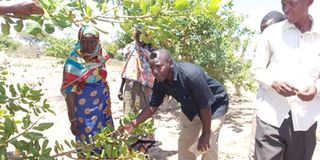World Wide Fund donates drought resistant seedlings to farmers in Lamu

Lamu, Ijara and Tana River WWF Programme Coordinator John Bett (in black shirt) admiring cashew nut trees in Kiangwe Village during a meeting with farmers on November 29, 2016. The fund is providing drought resistant seedlings to farmers in Lamu. PHOTO | KALUME KAZUNGU | NATION MEDIA GROUP
What you need to know:
- WWF landscape programme coordinator John Bett said they want to ensure food security among the locals.
- Farmers said the trenches have proved successful in keeping wild animals away from their farms
- Mr Bett said they have been able to reduce the problem of destruction of crops by wildlife in the region.
- In Basuba, the fund targets to help the minority Boni community.
Farmers from five villages prone to wildlife invasion in Basuba Ward in Lamu East have something to smile about.
The World Wide Fund (WWF) has intervened and provided them drought resistant seedlings.
Previously, the organisation dug trenches for farmers from Basuba, Milimani, Mangai, Mararani and Kiangwe villages around their farms in order to prevent wild animals from getting in and destroying crops.
With the seedlings provided by WWF, the farmers can now get good harvests despite the area being affected by persistent drought.
Speaking to journalists in Kiangwe Village when WWF officials visited the area, many of the farmers expressed gratitude to the fund for supporting them.
They said the trenches have proved successful in keeping wild animals away from their farms and, as such, they can now grow crops without trouble.
MORE HARVEST
“We appreciate what the organisation has done for us. We are now getting as much as 15 to 20 bags of maize per acre unlike before when the harvest wouldn’t go beyond four bags an acre,” said Mr Mohamed Shekuwe of Kiangwe Village.
Addressing the farmers WWF landscape programme coordinator for Lamu, Ijara and Tana John Bett said they want to ensure food security among the locals.
Mr Bett said they started the programme as a pilot project in 2014 and they have been able to reduce the problem of destruction of crops by wildlife in the region.
“We will continue assisting the farmers through provision of drought resistant seeds including maize, beans, simsim and others.
“We have also introduced cash crops including cashew nuts and coconut trees which [they will] use for subsistence and also get surplus [for sale] which will [help] them in paying fees for their children,” said Mr Bett.
“In Basuba, we are specifically targeting farmers from the Boni minority community who are victims of human-wildlife conflicts.
“We have dug game moats around their farms considering they live so close to wildlife habitats. We want to ensure they plant and harvest even in tough climatic conditions like drought,” Mr Bett added.





